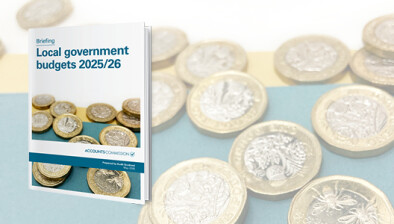Watchdog notes Clackmannanshire Council’s progress but warns of financial sustainability

Clackmannanshire Council has demonstrated continuous improvement on key areas over the last five years but must now urgently address its financial situation, the local authority watchdog has concluded.
Like many councils across Scotland, Clackmannanshire is facing significant financial pressures, and needs to make £22 million of savings by 2026/27. Whilst it has made savings in the past, this has depended on reserves and one-off savings, an approach that cannot continue.
A report from the Accounts Commission, based on the 2022/23 annual audit, highlights that the council must develop and deliver its programme of transformation to ensure financial sustainability. More detail is needed regarding the projects and programmes that will deliver savings and improve outcomes. The council also needs to ensure it has the resources in place to deliver this change.
The Commission has urged the council to develop a medium-term financial strategy, clearly linked to its other strategic plans for transformation, workforce and investment in buildings and infrastructure. Importantly, financial plans must also show how current funding challenges with the local Health and Social Care Partnership will be addressed.
While noting improvements at the council, the report said that some services for local people deteriorated in recent years, with challenges in maintaining staffing levels in some areas, further reducing performance. The council must be clearer on the action being taken to tackle this poor performance.
Jo Armstrong, chair of the Accounts Commission, said: “Today’s report highlights the progress made by Clackmannanshire Council. The council should rightly be proud of these achievements. There are positive working relationships between councillors and staff and across political parties, with evidence of collaborative working to agree priorities and budgets. But we cannot ignore the fact that the council faces a particular combination of challenges, including strain across recruitment, staff capacity and high sickness absence.
“This is alongside the financial challenges faced by all local authorities in Scotland. The council must develop in more detail and deliver on its plans to transform how it works and the services it will deliver in the future. This is critical to ensure it can operate within budget. We look forward to reviewing the progress made in the 2023/24 annual audit report.”
Positive areas of work commended by the Commission include:
- Councillors and officers working collaboratively to agree the council’s priorities and budget
The positive working relationship between administration and opposition parties
The good working relationship with community planning partners
Engagement with communities over our priorities
The comprehensive climate change strategy with ambitious targets which involves communities in key decisions
The report also highlights its Local Outcomes Improvement Plan (LOIP) which sets out community empowerment as a strategic priority. And the Commission also welcomed the council’s approach to engaging with local communities.
The report was considered at the meeting of the Accounts Commission earlier this month.
Council leader Ellen Forson said: “It was great to hear the Accounts Commission say that our report is probably one of the best reports they’ve seen at its public meeting on 12th September. For Scotland’s smallest mainland authority to show we continue to punch above our weight on so many fronts was really good to hear. It’s fantastic to have our hard work and all the progress we have made acknowledged by our watchdog.
“I’m also keen to point out that, while we have made significant progress, we are not complacent. We absolutely realise the significant challenges ahead, particularly in respect of financial sustainability as the Accounts Commission has highlighted. We also recognise that many of these challenges lie outwith our control. That is why we have prioritised transformation and collaborative working, with the aim of achieving financial stability, for the past six years, and will continue to do so in the future.”
The council said it has taken £70m worth of savings since 2010 against a current revenue budget of £161m. The drive for service and financial sustainability is a key driver of its Be the Future transformation programme, which was agreed in 2018.
The report highlights successful partnership working in the Family Wellbeing Partnership (FWP). Through the work of the FWP, resources and staff are moving closer to communities, integrating services, and involving and empowering individuals in the design and delivery of services. With investment of more than £2.5m since 2020, including from the Scottish Government and the Hunter Foundation, new ways of working are being developed, and creating communities where “everyone has the opportunity to flourish”, the council said.
This shift in delivery and approach is already strengthening collaboration with community organisations and partners and is enabling Clackmannanshire to continue to support its communities and improve outcomes for local people. Columba 1400 continues to work alongside the council and its communities to drive a leadership culture where people do things differently.
The report goes on to describe the Stirling & Clackmannanshire City Region Deal community wealth building initiatives and the award-winning multi-agency rapid intervention service model, STRIVE as further examples of successful partnership arrangements.
The council has a number of innovative partnership and collaborative arrangements with public, private and third sector organisations to counter the challenges associated with being the smallest mainland local authority, which can present capacity issues. This approach is embedded in Be the Future Target Operating Model, where the Council recognises that services need to be delivered through a range of different approaches.
Chief executive Nikki Bridle added: “My thanks go to our staff, our communities, our partners and our collaborators for their hard work and support in helping us to get to where we are. I very much look forward to continuing to work together on our shared ambitions and priorities for Clackmannanshire. There is no doubt we are working in a very challenging context and we remain resolute in seeking to address these challenges together.”







